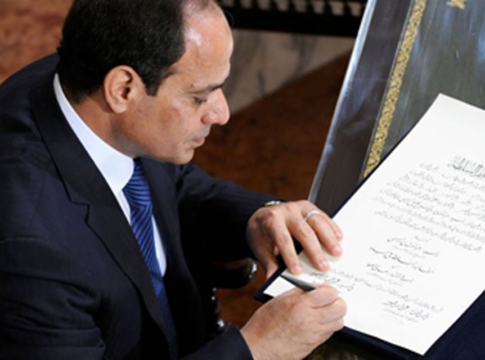When Abdel-Fattah El-Sisi was sworn in as president of Egypt on 8 June 2014 he pledged that he would work to improve the standard of living for Egyptians and restore stability after three years of political turmoil and security lapses.
President El-Sisi came after a tumultuous year following the overthrow of Islamist president Mohamed Morsi amid mass protests to his rule.
In the president’s first two years he had to face terrorist organizations which threatened to undermine the country’s internal security, and at the same time put the country on sound economic tracks after two years of chaos and turbulence.
“The two years, 2014 and 2015, were critical for President El-Sisi,” says Gamal Zahran, a professor of political science at Suez Canal University. “He made the fight against terrorist organizations, achieving stability and improving the economy, his top priorities. But it soon became clear it would take longer than two years for Egypt to emerge from its security and economic crises.”
Egypt’s foreign exchange reserves in 2015 stood at just $15 billion, down from $36 billion when Egypt’s longtime president Hosni Mubarak’s resign in February 2011.
Success in Numbers
(From Reality)
- Unemployment Rate:
2013 2021
13.4% 7.2%
- Growth Rate:
2013 2021
2.9% 3.6%
- Inflation Rate:
2013 2021
30% 4.`%
- Cash Reserves:
2013 2021
$14.5bln $40.4bln
- Remittances of Egyptian abroad:
$ 23.4blns
- Tax Exemption Limit:
60%
- Surplus (2020 Budget):
LE 2.7blns
- Growth Rate (2021/2022)
Reducing the unemployment
rate to the lowest level (since 30 years)
- Investments Sector:
Over the past seven years. Egypt make significant
Achievements of 39 projects at a cost of LE4billions& 828 millions
- Trade & Industry Sector:
Over the past seven years, Egypt has had a clear
Strategic vision for localization through 89 projects
With investments of LE 47bln
- Agriculture sector:
Over the past seven years, Agriculture sector have
Gained 224 projects at a cost of LE 17billions.
- Oil Sector:
Over the past seven years, Egypt witnessed 115 oil projects at a cost of LE 15billions & 261 millions
- Tourism Sector:
Over the past seven years, Egypt has witnessed a
Great interest in tourism , 101 projects have been
achieved at a cost of LE 410 millios.
- Housing Sector & Slums:
Over the past seven years, Egypt achieved
Construction of 627.000 housing units and 338.35
Are going on at a cost of LE 107 billions
- Education Sector:
Over the past seven years, during El-Sisi’s era Educational development has been achieved excellent results through 5086 at a total investments of LE 31billions & 289 millions
The higher education development witnessed 1484 projects at a total investments of LE 17 billions and
157 miilions
- Health Sector :
Over the past 7 years, the health sector development
Witnessed 960 projects at a total investments of
LE81 billions & 290 millions.
- Roads & Bridges:
Over the past 7 years, Egypt achieved 377 projects
At a total investments of LE 95 billios.
- ‘Hayah Karima Initiative’ :
Hayay Karma “Decent Life”, President ElSisi’s initiative to develop, ease and change people’s life
In Egypt’s villages with offering services.
LE103 billion allocated for the services improvement.
Minister of Finance Mohamed Maait said in a TV interview that when President El-Sisi took office in 2014, Egypt was facing the real possibility of bankruptcy.
“We were suffering a severe shortage of foreign exchange to buy wheat and medicines,” said Maait. “In 2015, the Paris-based Organization for Economic Cooperation and Development considered Egypt a high-risk country for foreign investments because of instability and security.
threats. Now, after seven years under President El-Sisi’s leadership, Egypt today is economically prosperous.”
President El-Sisi’s decision to seek help from the IMF and implement radical economic reform program was historic, argued Maait. “He knew that this program could trigger wide-scale social unrest and mass protests from the people but he opted to shoulder his responsibilities and take the risk.”
The first phase of the IMF-inspired economic reform program (2016-2019) proved very successful, though it was hard for a majority of Egyptians. The devaluation of the Egyptian pound in November 2016 and the phasing out of fuel and electricity subsidies negatively affected Egyptians’ spending power.
Minister of Planning and Economic Development Hala Al-Said that two weeks ago “the economic reform program was a bitter pill that the chronically ill Egyptian economy had to swallow.”
“What made the program’s success,” says Maait, “was the public’s awareness that it was indispensable. The country couldn’t recover without the reforms.”
President El-Sisi said in a speech in August 2016, two months ahead of the implementation of the IMF program, that he would not shirk the economic reforms that previous presidents had avoided for fear of mass protests.
During a youth conference in the New Administrative Capital on 30 June 2019, El-Sisi revealed that “when we signed the agreement on the economic reform program with the IMF I told the cabinet we should all be ready to resign if the public rejected the reforms.”
The economic reforms adopted between 2016 and 2019 led to the budget deficit being cut from 12.5 per cent of GDP in 2016 to 7.9 per cent in 2020. It is expected to drop to 7.7 per cent in 2021 and 6.7 per cent in 2022.


